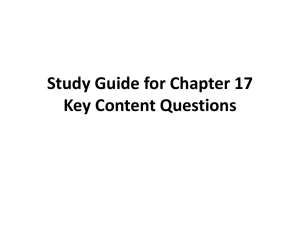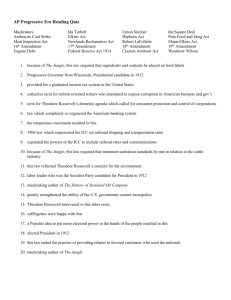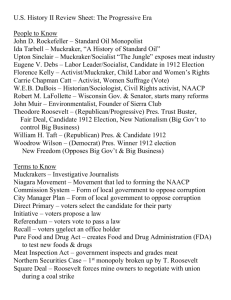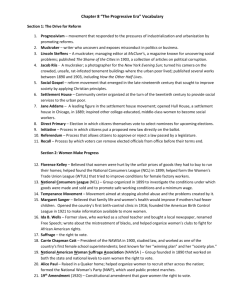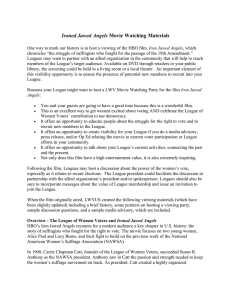Terms and People Homestead Act
advertisement
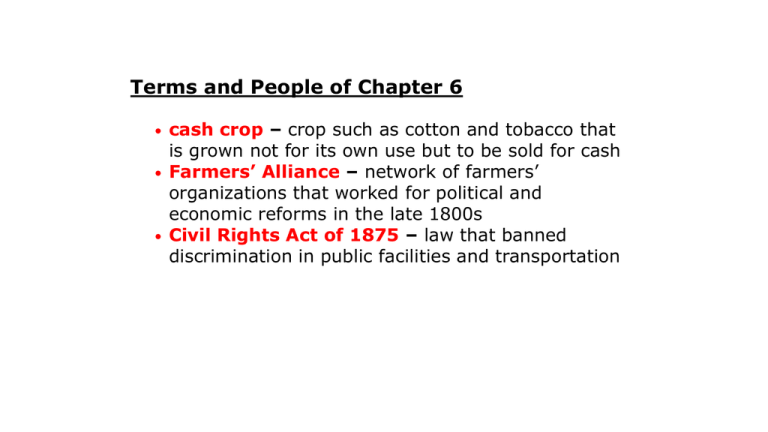
Terms and People of Chapter 6 cash crop – crop such as cotton and tobacco that is grown not for its own use but to be sold for cash • Farmers’ Alliance – network of farmers’ organizations that worked for political and economic reforms in the late 1800s • Civil Rights Act of 1875 – law that banned discrimination in public facilities and transportation • Terms and People • reservation – specific area set aside by the federal government for the Indians’ use • Sand Creek Massacre – 1864 incident in which Colorado militia killed a camp of unarmed Cheyenne and Arapaho Indians • Sitting Bull – Sioux chief respected as a fighter and spiritual leader • Battle of the Little Big Horn – 1876 battle in which the Sioux defeated U.S. troops led by Colonel George Custer Terms and People • Chief Joseph – leader of the Nez Percés who surrendered after trying to lead a group of Indian refugees to Canada • Wounded Knee – 1890 confrontation between U.S. cavalry and the Sioux that marked the end of Indian resistance in the Ghost Dance War • assimilate – to adopt the culture and civilization of the dominant group in a society • Dawes General Allotment Act – 1887 law that divided reservation land into private family plots Terms and People • vigilante – self-appointed law enforcer • transcontinental railroad – rail link between the eastern and western United States • land grant – land given by the federal government for building railroads • open-range system – system in which ranchers did not fence in their property, allowing cattle to roam and graze freely Terms and People • Homestead Act – 1862 law in which the government offered farm plots of 160 acres to anyone willing to live on the land for five years, dig a well, and build a road • Exodusters –African Americans who migrated from the South to the West after the Civil War Terms and People of Chapter 7 • Jim Crow laws – laws that kept blacks and whites segregated • poll tax – a tax which voters were required to pay to vote • literacy test – a test, given at the polls to see if a voter could read, used to disenfranchise black citizens • grandfather clause – a law which allowed a person to vote only if his ancestors had voted prior to 1866, also used to disenfranchise black citizens Terms and People • Booker T. Washington – the most famous black leader during the late 19th century, he encouraged African Americans to build up their economic resources through hard work • W.E.B. Du Bois – a black leader in the late 19th century who disagreed with Washington and argued that blacks should demand full and immediate equality • Ida B. Wells – an African American teacher who bought a newspaper and embarked on a lifelong crusade against the practice of lynching Terms and People • Las Gorras Blancas – a group of Mexican Americans who protested their loss of land in the Southwest by targeting the property of large ranch owners Terms and People • spoils system – a system in which politicians awarded government jobs to loyal party workers with little regard for their qualifications • civil service – a system that includes federal jobs in the executive branch • Pendleton Civil Service Act – a law passed in 1883 that established a Civil Service Commission, which wrote a civil service exam • gold standard – using gold as the basis of the nation’s currency Terms and People • Oliver H. Kelley – a Minnesota farmer and businessman who organized the Grange • Grange – an organization of farmers who joined to learn about new farming techniques, to call for the regulation of railroad and grain elevator rates, and to prompt the establishment of the ICC • Populist Party – a political party formed in 1892 on a platform of silver coinage, government ownership of the railroads, and fighting the corrupt and unresponsive elite Terms and People • William Jennings Bryan – the Democratic nominee for president in 1896, who supported many Populist principles including silver coinage, and who toured the country to speak directly to voters • William McKinley – the Republican candidate for president in 1896, who followed a traditional strategy of letting party workers campaign for him Terms and People of Chapter 8 • Progressivism – movement that believed honest and efficient government could bring about social justice • muckrakers – socially conscious journalists and writers who dramatized the need for reform • Lincoln Steffens – muckraking author of Shame of the Cities, exposed corruption in urban government • Jacob Riis – muckraking photographer and author of How The Other Half Lives, exposed the condition of the urban poor Terms and People • Social Gospel – belief that following Christian principles could bring about social justice • settlement house – community center that provided services for the urban poor • Jane Addams – leader in the settlement house movement • direct primary – allowed voters to select candidates rather than having them selected by party leaders Terms and People • initiative – gave citizens the power to propose laws • referendum – allowed citizens to reject or accept laws passed by their legislature • recall – gave voters the power to remove legislators before their term is up Terms and People • Florence Kelley – founded the National Consumer’s League known as the NCL • National Consumer’s League (NCL) – labeled and publicized “goods produced under fair, safe, and healthy working conditions” • temperance movement – campaign to end the production, sale, and use of alcohol • Margaret Sanger – opened the first birth control clinic • Ida B. Wells – helped to found the National Association of Colored Women Terms and People • suffrage – the right to vote • Carrie Chapman Catt – president of the NAWSA, campaigned to pass women’s suffrage at both the state and national levels • NAWSA – National American Woman Suffrage Association • Alice Paul – social activist, led women to picket at the White House • Nineteenth Amendment – 1919, granted women the right to vote Terms and People • Americanization – effort to replace immigrant customs with white, Protestant, middle-class practices and values • Booker T. Washington – favored a gradualist approach for blacks to earn rights through economic progress and employment in the skilled trades • W.E.B. Du Bois – demanded immediate and full rights for blacks as guaranteed by the Constitution Terms and People • Niagara Movement – opposed Washington’s approach; favored education in history, literature, and philosophy, not just in the trades • NAACP – National Association for the Advancement of Colored People, viewed full legal rights as the only solution to racial discrimination • Urban League – organization to assist working class African Americans with relief, jobs, clothing, and schools Terms and People • Anti-Defamation League – organization to defend Jews and others from false statements, and verbal or physical attacks • mutualistas – Mexican American groups that provided loans, legal assistance, and disability insurance for members Terms and People • Theodore Roosevelt – energetic Progressive who became the youngest president in 1901 • Square Deal – Roosevelt’s program to keep the wealthy and powerful from taking advantage of small business owners and the poor • Hepburn Act – gave the Interstate Commerce Committee power to limit railroad company prices • Meat Inspection Act – gave federal agents power to inspect and monitor the meatpacking industry Terms and People • Pure Food and Drug Act – gave the federal government responsibility for insuring food and medicine are safe • John Muir – California naturalist who advocated for the creation of Yosemite National Park • Gifford Pinchot – forestry official who proposed managing the forests for later public use Terms and People • National Reclamation Act – gave the federal government power to decide where and how water would be distributed in arid western states • New Nationalism – Roosevelt’s 1912 plan to restore the government’s trustbusting power • Progressive Party – Roosevelt’s party in the 1912 election Terms and People • Woodrow Wilson – Progressive Democrat elected President in 1912 • New Freedom – Wilson’s program to place strict government controls on corporations • Sixteenth Amendment – gave Congress the power to impose an income tax • Federal Reserve Act – placed the national banks under the control of a Federal Reserve Board Terms and People • Federal Trade Commission – group appointed by the President to monitor business practices that might lead to a monopoly • Clayton Antitrust Act – strengthened antitrust laws by spelling out specific practices in which businesses could not engage
